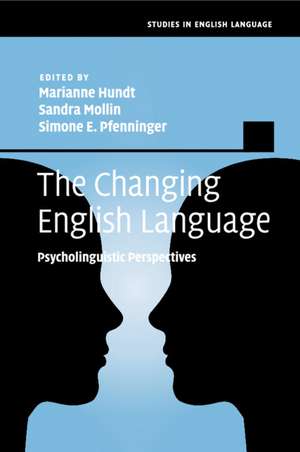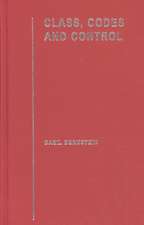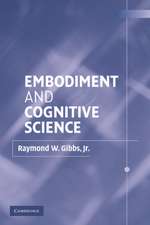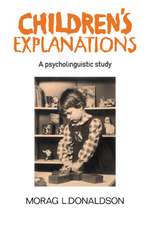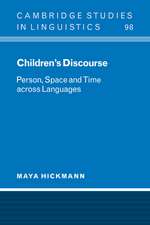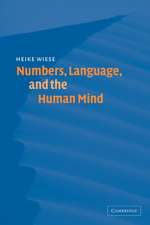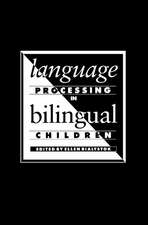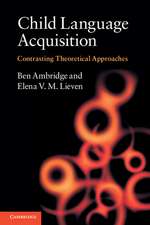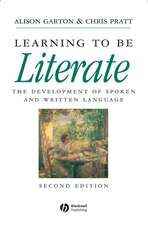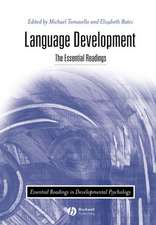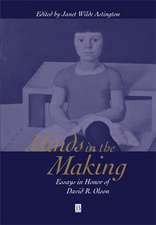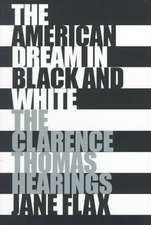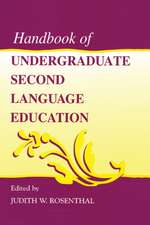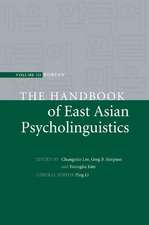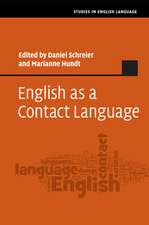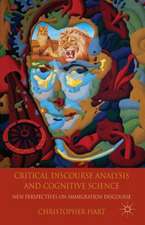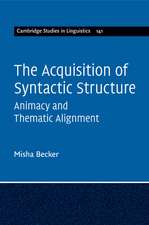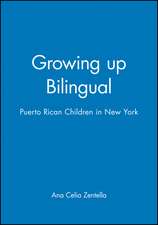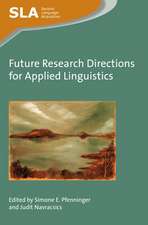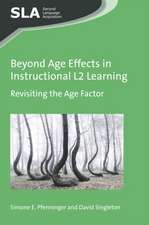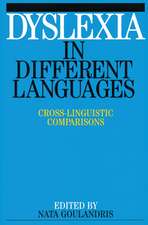The Changing English Language: Psycholinguistic Perspectives: Studies in English Language
Editat de Marianne Hundt, Sandra Mollin, Simone E. Pfenningeren Limba Engleză Paperback – apr 2020
| Toate formatele și edițiile | Preț | Express |
|---|---|---|
| Paperback (1) | 324.40 lei 6-8 săpt. | |
| Cambridge University Press – apr 2020 | 324.40 lei 6-8 săpt. | |
| Hardback (1) | 837.65 lei 6-8 săpt. | |
| Cambridge University Press – 19 iul 2017 | 837.65 lei 6-8 săpt. |
Din seria Studies in English Language
-
 Preț: 216.88 lei
Preț: 216.88 lei - 14%
 Preț: 725.57 lei
Preț: 725.57 lei -
 Preț: 297.78 lei
Preț: 297.78 lei -
 Preț: 237.53 lei
Preț: 237.53 lei -
 Preț: 186.25 lei
Preț: 186.25 lei -
 Preț: 176.95 lei
Preț: 176.95 lei - 9%
 Preț: 592.62 lei
Preț: 592.62 lei -
 Preț: 184.59 lei
Preț: 184.59 lei -
 Preț: 238.40 lei
Preț: 238.40 lei - 8%
 Preț: 524.94 lei
Preț: 524.94 lei -
 Preț: 286.22 lei
Preț: 286.22 lei - 14%
 Preț: 786.15 lei
Preț: 786.15 lei -
 Preț: 336.79 lei
Preț: 336.79 lei -
 Preț: 469.74 lei
Preț: 469.74 lei -
 Preț: 265.09 lei
Preț: 265.09 lei - 11%
 Preț: 454.16 lei
Preț: 454.16 lei -
 Preț: 285.93 lei
Preț: 285.93 lei -
 Preț: 463.98 lei
Preț: 463.98 lei - 14%
 Preț: 725.57 lei
Preț: 725.57 lei - 11%
 Preț: 513.37 lei
Preț: 513.37 lei -
 Preț: 303.60 lei
Preț: 303.60 lei -
 Preț: 391.41 lei
Preț: 391.41 lei -
 Preț: 372.59 lei
Preț: 372.59 lei - 11%
 Preț: 480.74 lei
Preț: 480.74 lei -
 Preț: 291.43 lei
Preț: 291.43 lei - 14%
 Preț: 785.32 lei
Preț: 785.32 lei - 22%
 Preț: 271.40 lei
Preț: 271.40 lei -
 Preț: 358.66 lei
Preț: 358.66 lei - 14%
 Preț: 728.05 lei
Preț: 728.05 lei - 11%
 Preț: 664.13 lei
Preț: 664.13 lei -
 Preț: 416.37 lei
Preț: 416.37 lei - 14%
 Preț: 720.95 lei
Preț: 720.95 lei - 14%
 Preț: 789.43 lei
Preț: 789.43 lei - 11%
 Preț: 471.71 lei
Preț: 471.71 lei -
 Preț: 363.66 lei
Preț: 363.66 lei - 14%
 Preț: 728.90 lei
Preț: 728.90 lei - 14%
 Preț: 729.08 lei
Preț: 729.08 lei -
 Preț: 279.38 lei
Preț: 279.38 lei -
 Preț: 279.85 lei
Preț: 279.85 lei -
 Preț: 352.67 lei
Preț: 352.67 lei -
 Preț: 285.93 lei
Preț: 285.93 lei
Preț: 324.40 lei
Nou
Puncte Express: 487
Preț estimativ în valută:
62.08€ • 64.73$ • 51.60£
62.08€ • 64.73$ • 51.60£
Carte tipărită la comandă
Livrare economică 20 martie-03 aprilie
Preluare comenzi: 021 569.72.76
Specificații
ISBN-13: 9781107451728
ISBN-10: 1107451728
Pagini: 430
Ilustrații: 26 b/w illus. 24 tables
Dimensiuni: 152 x 230 x 23 mm
Greutate: 0.58 kg
Editura: Cambridge University Press
Colecția Cambridge University Press
Seria Studies in English Language
Locul publicării:New York, United States
ISBN-10: 1107451728
Pagini: 430
Ilustrații: 26 b/w illus. 24 tables
Dimensiuni: 152 x 230 x 23 mm
Greutate: 0.58 kg
Editura: Cambridge University Press
Colecția Cambridge University Press
Seria Studies in English Language
Locul publicării:New York, United States
Cuprins
1. Introduction: language history meets psychology Marianne Hundt, Sandra Mollin and Simone E. Pfenninger; Part I. Frequency: 2. The Ecclesiastes principle in language change Harald Baayen, Fabian Tomaschek, Susanne Gahl and Michael Ramscar; 3. Frequencies in diachronic corpora and knowledge of language Martin Hilpert; Part II. Salience: 4. Salience in language usage, learning, and change Nick C. Ellis; 5. Low salience as an enabling factor in morphosyntactic change Elizabeth C. Traugott; Part III. Chunking: 6. Chunking in language usage, learning, and change: I don't know Nick C. Ellis; 7. Chunking and changes in compositionality in context Joan L. Bybee and Carol Lynn Moder; Part IV. Priming: 8. Priming and language change Martin J. Pickering and Simon Garrod; 9. From priming and processing to frequency effects and grammaticalisation? Contracted semi-modals in present-day English Christian Mair; Part V. Analogy: 10. The role of analogy in language processing and acquisition Heike Behrens; 11. The role of analogy in language change: supporting constructions Hendrik de Smet and Olga Fischer; Part VI. Ambiguity: 12. Syntactic ambiguity in real-time language processing and diachronic change Claudia Felser; 13. Ambiguity and vagueness in historical change David Denison; Part VII. Acquisition and Transmission: 14. Developing language from usage: explaining errors Elena V. M. Lieven; 15. Transferring insights from child language acquisition to diachronic change (and vice versa) María José López-Cous.
Recenzii
'This innovative collection sketches what a long overdue cooperation of psycholinguistics and language change could look like. By systematically investigating key psycholinguistic factors from both perspectives, it closes a striking gap in historical linguistics.' Lieselotte Anderwald, Christian-Albrechts-Universität zu Kiel
'This is an admirable example of how a sophisticated analysis of a narrowly defined and partly even invisible phenomenon can reveal deep insights into language acquisition, with wide-ranging consequences for syntactic theory. As such, it is also a demonstration of how acquisition research can inform grammatical theory. Beautifully written, this book is therefore highly recommended to a readership not only interested in language acquisition but also in syntactic theory.' Jürgen Meisel, Universität Hamburg
'Each chapter in this book provides many research ideas for different scholars in any linguistics field like corpus linguistics, psycholinguistics, TESOL, etc. both theoretically and empirically. These research ideas can help flourish these two disciplines much better and establish a fully interdisciplinary field.' Pouya Vakili, LINGUIST List
'This is an admirable example of how a sophisticated analysis of a narrowly defined and partly even invisible phenomenon can reveal deep insights into language acquisition, with wide-ranging consequences for syntactic theory. As such, it is also a demonstration of how acquisition research can inform grammatical theory. Beautifully written, this book is therefore highly recommended to a readership not only interested in language acquisition but also in syntactic theory.' Jürgen Meisel, Universität Hamburg
'Each chapter in this book provides many research ideas for different scholars in any linguistics field like corpus linguistics, psycholinguistics, TESOL, etc. both theoretically and empirically. These research ideas can help flourish these two disciplines much better and establish a fully interdisciplinary field.' Pouya Vakili, LINGUIST List
Descriere
Experts from psycholinguistics and English historical linguistics address core factors in language change.
